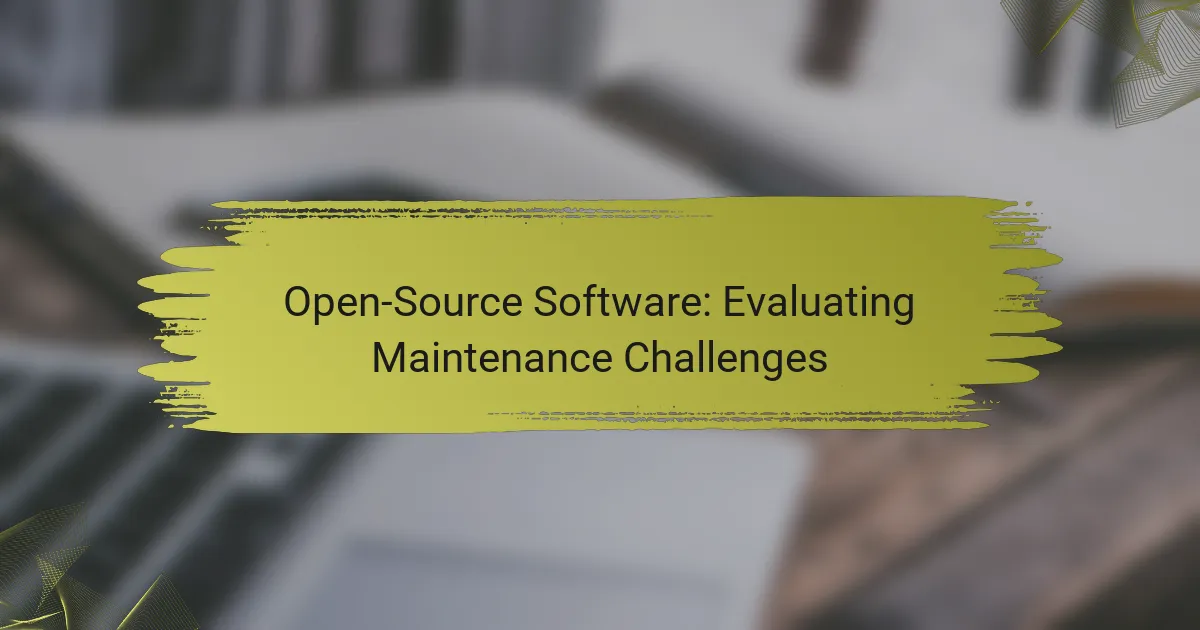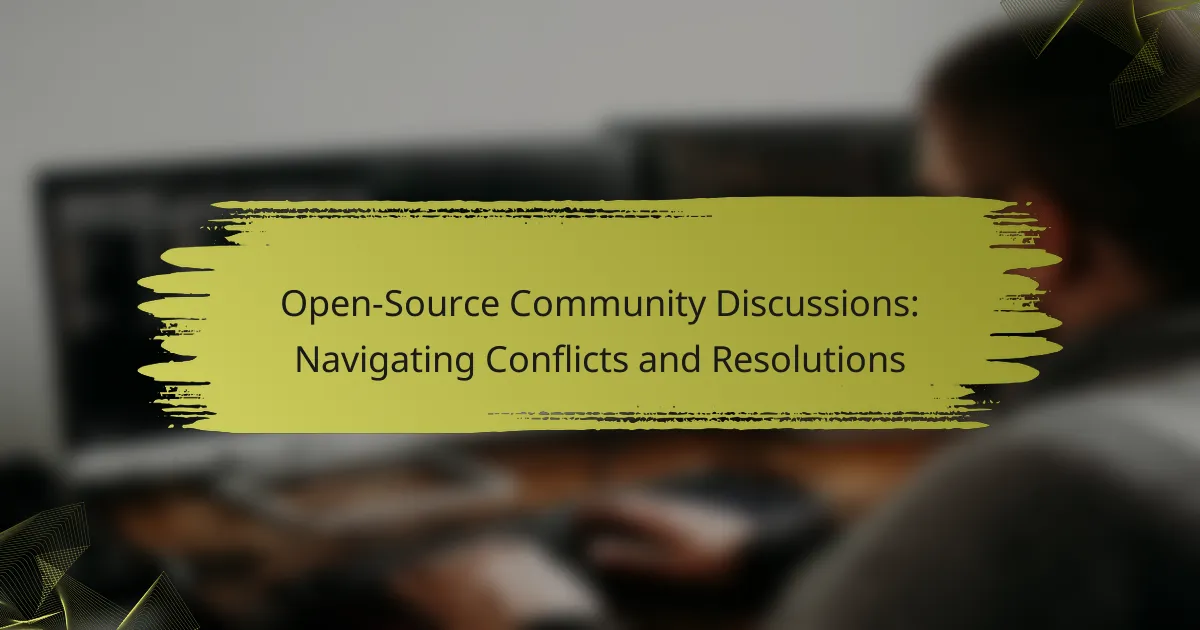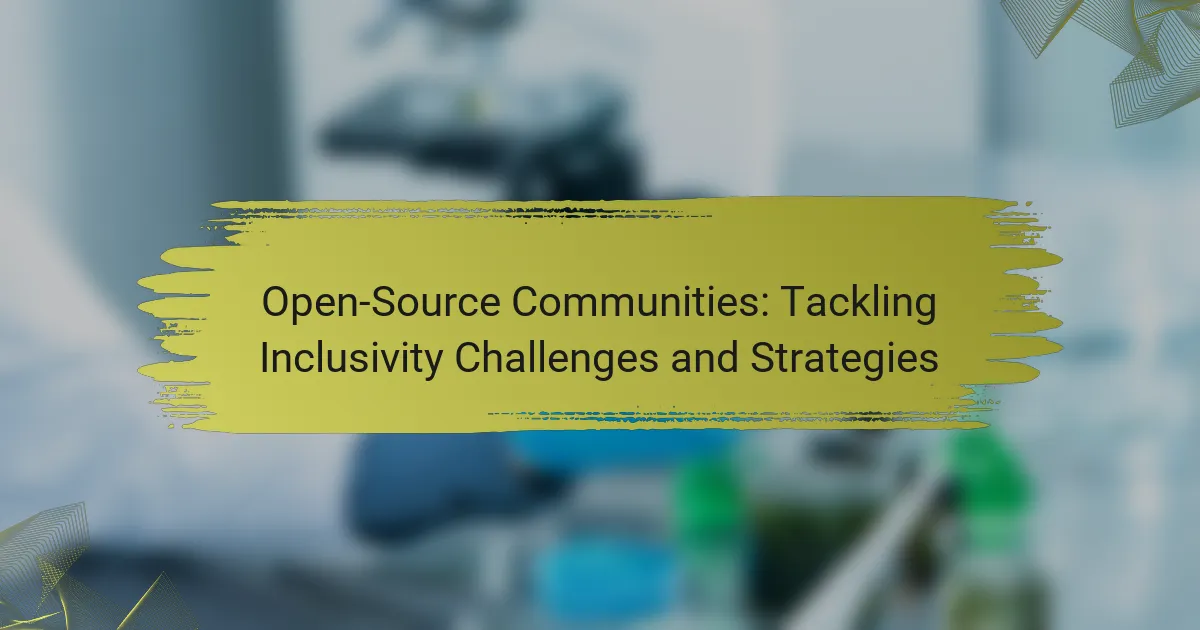Open-source software is a powerful resource, but it often encounters significant maintenance challenges that threaten its sustainability. Issues such as dependency management, documentation consistency, and security vulnerabilities can complicate ongoing development. To address these hurdles, organizations can implement structured practices and utilize essential tools that promote reliability and foster community engagement.
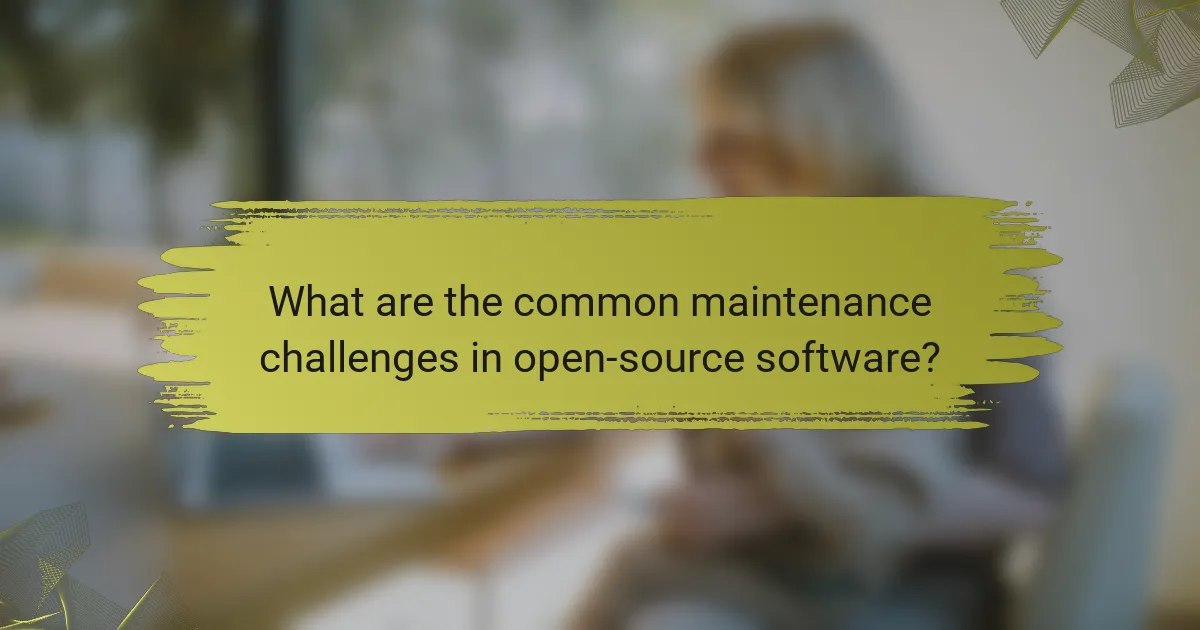
What are the common maintenance challenges in open-source software?
Open-source software often faces several maintenance challenges that can hinder its long-term viability. Key issues include managing dependencies, ensuring documentation consistency, engaging contributors, addressing security vulnerabilities, and resolving version control conflicts.
Dependency management issues
Dependency management issues arise when open-source projects rely on external libraries or frameworks that may change or become obsolete. This can lead to compatibility problems, where updates in one dependency break functionality in another.
To mitigate these challenges, developers should regularly review and update dependencies, use tools like dependency checkers, and establish clear guidelines for versioning. Keeping dependencies up to date can prevent technical debt and reduce the risk of failures.
Inconsistent documentation
Inconsistent documentation can create confusion for users and contributors, making it difficult to understand how to use or contribute to the software. When documentation is outdated or poorly organized, it can lead to misinterpretations and errors in implementation.
To improve documentation, maintainers should prioritize clarity and consistency, regularly update content, and encourage community contributions. Utilizing templates and style guides can help standardize documentation practices across the project.
Limited contributor engagement
Limited contributor engagement is a common challenge in open-source projects, as many rely on volunteers who may not have the time or motivation to contribute consistently. This can lead to stagnation in development and maintenance.
To foster engagement, project leaders should create a welcoming environment, provide clear onboarding processes, and recognize contributors’ efforts. Regular communication through forums, newsletters, or social media can also help keep contributors informed and motivated.
Security vulnerabilities
Security vulnerabilities pose significant risks to open-source software, as they can be exploited by malicious actors. The open nature of these projects can make it easier for vulnerabilities to be discovered but also more challenging to manage them effectively.
To address security concerns, maintainers should implement regular security audits, encourage responsible disclosure of vulnerabilities, and stay informed about security best practices. Utilizing automated tools for vulnerability scanning can also enhance security measures.
Version control conflicts
Version control conflicts occur when multiple contributors make changes to the same part of the codebase, leading to discrepancies that must be resolved before integration. This can slow down development and create frustration among contributors.
To minimize conflicts, teams should establish clear branching strategies, encourage frequent commits, and communicate changes effectively. Utilizing pull requests can facilitate code reviews and help catch potential conflicts early in the development process.
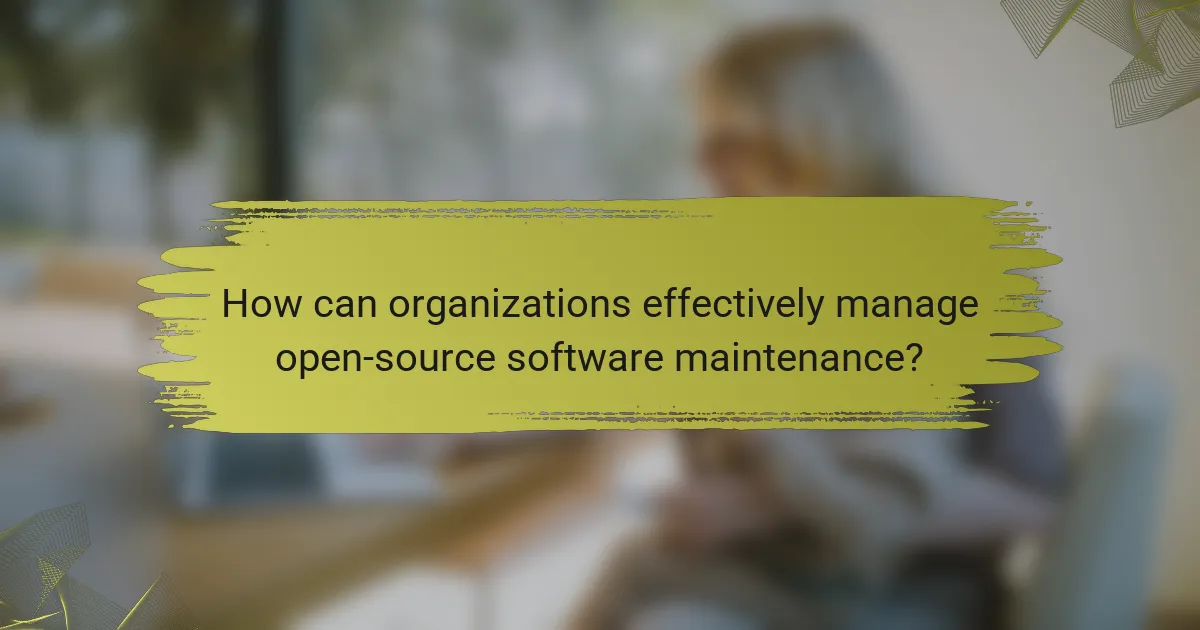
How can organizations effectively manage open-source software maintenance?
Organizations can manage open-source software maintenance by adopting structured practices that enhance reliability and community engagement. Key strategies include implementing automated testing, establishing clear contribution guidelines, utilizing dependency management tools, and actively engaging with the community.
Implement automated testing
Automated testing is essential for maintaining the integrity of open-source software. By integrating continuous integration (CI) systems, organizations can run tests automatically whenever changes are made, ensuring that new contributions do not introduce bugs.
Consider using frameworks like Jest or Mocha for JavaScript projects, which allow for quick setup and execution of tests. Aim to achieve a test coverage of at least 70% to ensure that most of your code is validated by tests.
Establish clear contribution guidelines
Clear contribution guidelines help streamline the process for external developers wishing to contribute. These guidelines should outline coding standards, the process for submitting pull requests, and how to report issues.
Providing a well-documented CONTRIBUTING.md file in the repository can significantly reduce confusion. Include examples of good and bad contributions to illustrate expectations effectively.
Utilize dependency management tools
Dependency management tools are crucial for tracking and updating libraries used in open-source projects. Tools like npm for JavaScript or pip for Python help manage dependencies and ensure that projects remain compatible with the latest versions.
Regularly review and update dependencies to avoid security vulnerabilities. Set up alerts for outdated packages, and consider using tools like Dependabot to automate this process.
Engage with the community
Active engagement with the open-source community fosters collaboration and innovation. Organizations should participate in forums, respond to issues, and encourage discussions around feature requests and improvements.
Hosting regular community meetings or contributing to platforms like GitHub Discussions can enhance transparency and encourage more developers to get involved. Recognizing contributors through shout-outs or rewards can also motivate ongoing participation.
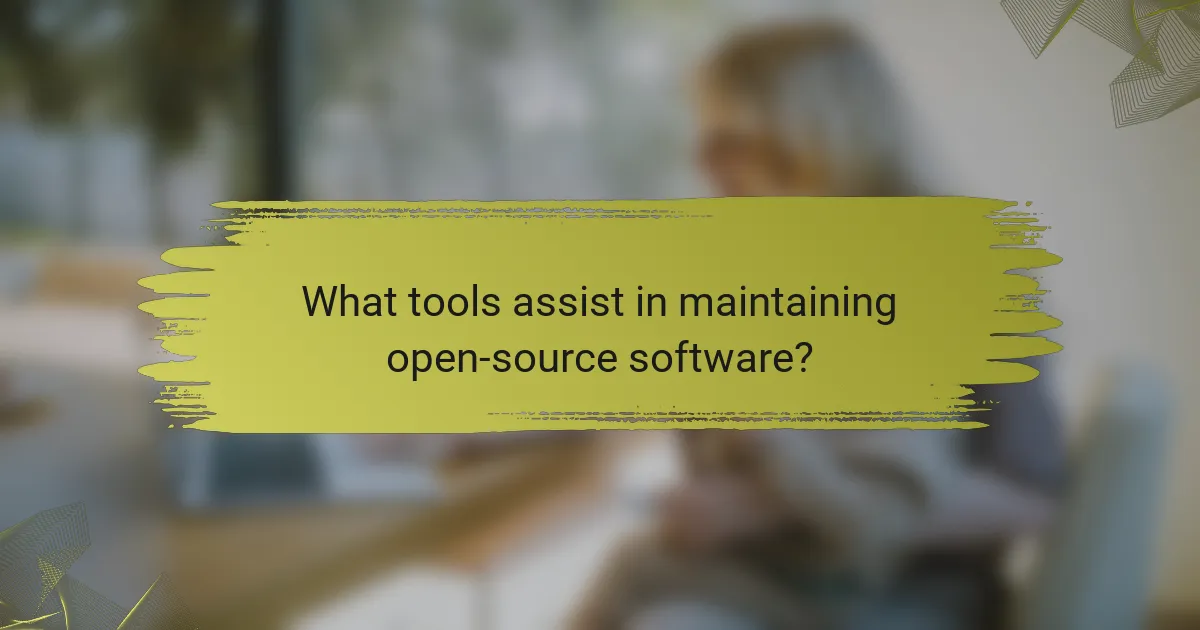
What tools assist in maintaining open-source software?
Several tools are essential for maintaining open-source software effectively. These tools help streamline version control, automate testing, manage dependencies, and ensure security, which are critical for the longevity and reliability of projects.
GitHub for version control
GitHub is a widely used platform for version control that allows developers to track changes in their codebase. It provides features like branching, pull requests, and issue tracking, enabling teams to collaborate efficiently.
To maintain an open-source project on GitHub, regularly merge pull requests and manage branches to keep the main codebase clean. Utilize GitHub Actions for automating workflows, such as running tests or deploying code upon updates.
Travis CI for continuous integration
Travis CI is a continuous integration tool that automatically builds and tests code changes in GitHub repositories. It helps catch issues early by running tests every time new code is pushed.
To implement Travis CI, configure a .travis.yml file in your repository to define the build environment and test commands. This setup allows for quick feedback on code quality, ensuring that only stable code is merged into the main branch.
Dependabot for dependency updates
Dependabot is a tool that automates the process of updating dependencies in your project. It monitors your dependencies for outdated versions and creates pull requests to update them, which helps keep your software secure and up-to-date.
To use Dependabot, enable it in your GitHub repository settings and configure the update frequency. Regularly merging these updates can prevent vulnerabilities and compatibility issues, making your project more robust.
Snyk for security scanning
Snyk is a security tool that scans your code and dependencies for vulnerabilities. It provides detailed reports and remediation advice, helping developers address security issues proactively.
Integrate Snyk into your development workflow by using its GitHub integration or CLI tool. Regularly scan your project to identify and fix vulnerabilities, ensuring that your open-source software remains secure against potential threats.
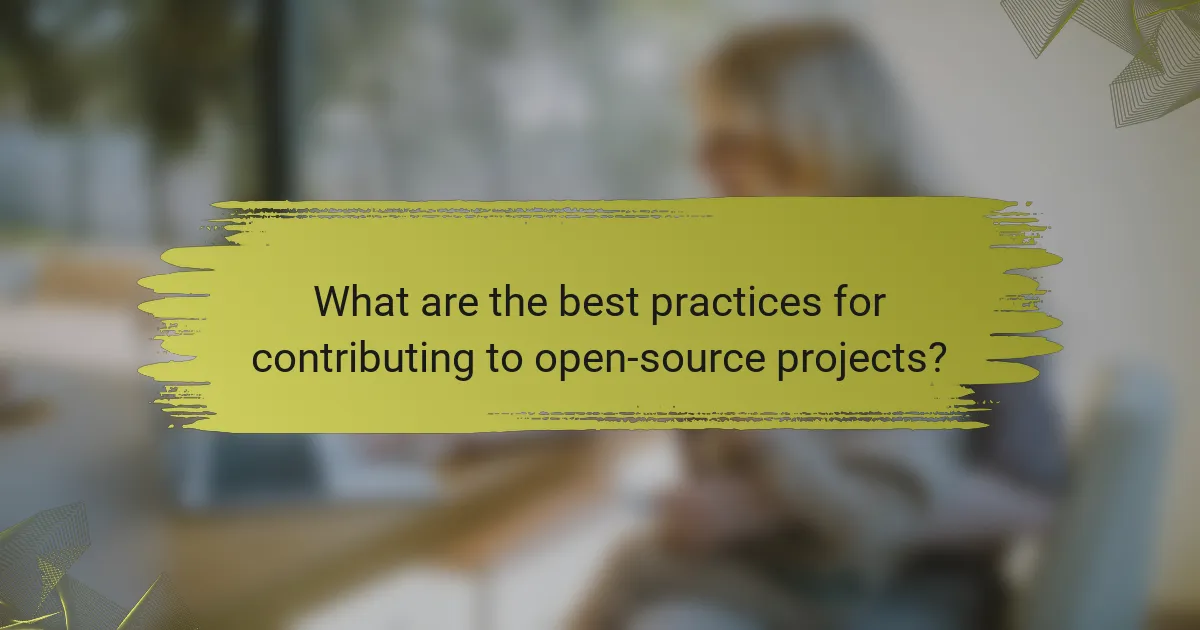
What are the best practices for contributing to open-source projects?
Contributing to open-source projects effectively requires adherence to established best practices that enhance collaboration and maintainability. Key practices include following coding standards and documenting changes thoroughly to ensure clarity and consistency across the project.
Follow coding standards
Adhering to coding standards is crucial for maintaining code quality and readability in open-source projects. These standards often include guidelines on naming conventions, file organization, and formatting styles, which help ensure that all contributors can understand and work with the codebase efficiently.
Common coding standards include using consistent indentation, meaningful variable names, and avoiding overly complex structures. For example, many projects adopt the Google Style Guide or the Airbnb JavaScript Style Guide, which provide comprehensive rules that can be easily followed.
Document changes thoroughly
Thorough documentation of changes is essential for effective collaboration in open-source projects. This includes writing clear commit messages, maintaining an updated changelog, and providing detailed pull request descriptions to explain the purpose and impact of changes made.
When documenting changes, aim for clarity and conciseness. Use bullet points to highlight key updates, and reference related issues or discussions to provide context. This practice not only aids current contributors but also helps future developers understand the evolution of the project.
